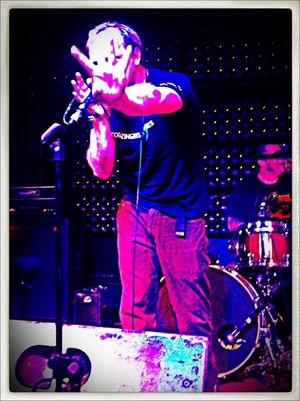In the fall of 1994, I was a junior in high school, while my older brother was a senior. We lived in a rural area of Southeast Texas, far removed from what most might call civilization. There were cows, but that’s about as advanced as the intelligent life got that far out. On a warm day towards the end of September, I went to rouse my brother from what I supposed was an after-school nap before heading off to his night job at a burger joint in the neighboring city. When I didn’t find him in his room, I looked outside. I found him in the backyard. He was lying on the foundation of a house my father was building. At his feet was a bible, with a verse underlined (a psalm I no longer recall) and a note stuck inside the pages. He had blown the back of his head off with a shotgun; blood was everywhere. I spoke to his body for several minutes before my stepmother’s voice behind me brought me to realize what I knew.
I’ve never been the same.
ALL MY PUNY SORROWS is a surprising dramedy adapted from the bestseller by Miriam Toews by director Michael McGowan. It deals with multigenerational trauma in a Mennonite family in Southern Canada. The two sisters at the crux of the film are both professional artists; one a concert pianist and the other a novelist. They speak, literally, in poetry.
Check out the trailer:
The film is a masterpiece; quiet, funny, and poignant, showcasing powerful performances over several generations of the Von Reisen family. Allison Pill (SCOTT PILGRIM VS THE WORLD, HBO’s “The Newsroom”) is captivating as Yoli, the younger sister to Elfie, played by Sarah Gadon (Amazons’ “11.22.63.”, Hulu’s “Castle Rock”). Both actresses give a weighty realism to the opposing views of survival in the face of crushing depression. Their anchor is their mother Lottie, played with devastating gravity by Mare Winningham (TURNER & HOOCH, ST. ELMO’S FIRE). Rounding out the family with varying levels of snark and care are Amybeth McNulty (Netflix’s “Stranger Things”) as Yoli’s daughter Nora and Mimi Kuzyk (“Blue Murder”, “The Chris Isaak Show”) as fiery Aunt Tina. Each of these actresses deliver performances that make the poetry of their dialogue believable and unpretentious, despite the script reading like an MFA thesis.
I got to speak with both screenwriter/director Michael McGowan and actress Allison Pill about the film. We discussed the conversations within the film as well as those which it should hope to spark, as well as the dynamite Donal Logue (THE TAO OF STEVE, BLADE), the potential backlash at the privilege and class prominent in the film, and, to finish on a high note, the incomparable and timeless SCOTT PILGRIM VS THE WORLD.
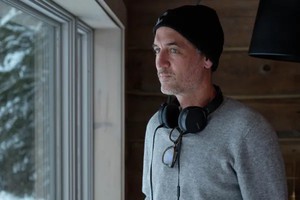
Michael McGowan - writer/director
Michael McGowan - Hey, how are you, Eric?
Eric McClanahan - I’m well, how are you?
MM - I’m good, thank you.
EM - Fantastic! So, we’re talking about ALL MY PUNY SORROWS, which you adapted from the novel as a screenplay and directed. So, let’s start at the beginning: what made you decide to adapt this novel into a screenplay? What about this work spoke to you?
MM - Well I loved the novel and I felt like it had dealt with suicide in a way I hadn’t seen before. I also thought because it was based on Miriam’s [Toews,the author of ALL MY PUNY SORROWS] own lived experience, though it was a novel it was essentially true in so many ways; that gave it a credibility. And also there were three incredible roles that she had written and I thought we could punch above our weight with casting if we got lucky.
EM - I can see that, and you very much did get lucky. The performances by those core three are so amazing. Let’s start with Sarah Gadon; how did you get her onboard?
MM - Well, it’s interesting. We’re both Canadian and it’s kind of a small community. I’d actually met her in LA a few years earlier to talk to her about it. She’d read the draft and had some good notes about it which was fantastic. I’d always thought of her as an Elfie and not a Yoli, so it wasn’t as though I could make an offer to her straightaway as it would hinge on Yoli’s age to determine who the others would be. Then we had a great casting director, Heidi Levitt out of LA, who really raised the profile of the script as we were getting a lot of interesting actors that we were looking at. Then when Allison [Pill] read it and loved it, it was an easy decision, because I’m a huge fan of her work and she’s so smart about things. She completely got the character. So once we got her, and as Sarah was already sort of involved, we quickly went to Sarah, and then looking for the Lottie character, it was an easy fit with Mare [Winningham], so it all came together rather quickly. But it sort of all hinged on Allison coming aboard.
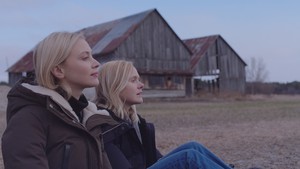
EM - I really appreciated the inclusion of Donal Logue in the cast. I’ve been a fan for a long time, but I’ve never seen him do anything quite like this. What was that conversation like?
MM - Well, Heidi suggested him and he was fantastic. It’s not a big part but he does some pretty big stuff. He really embraced it. One of my favorite scenes in the film is when he’s talking about going to [Canadian Prime Minister Pierre] Trudeau’s funeral and the way he commands the screen in that scene. He spoke with Miriam about her father; he dove deep. I remember when we were shooting the opening scene and I was looking at it through a small monitor under a black tarp we were using as a video village, and just watching his precision. He went out himself and bought those glasses and all the little things that he did to bring that character to life, I marveled at, both on set and in editing. He’s such an intelligent, interesting actor.
EM - Yeah, like I said, long time fan and I was so delighted to see him pop up in this, so understated and subdued. I really enjoyed that. So, did you face any challenges mounting this production in terms of the subject matter from producers?
MM - Well, it’s always a challenge. It’s a challenge just getting the money. The first challenge was really, for me, figuring out a way to adapt it. I stupidly thought it would be fairly easy. I write pretty quickly when I know what I’m doing, and I thought “this’ll be easy; I’ll write this in a month and then we’ll start trying to get financing together” and I got absolutely stuck. I had an early dinner with Miriam and I explained what I wanted to do and she was great about it, but then I was embarrassed because I was stuck and I was like “I don’t know what I was thinking!” Then I went out to dinner with her about a year later and sort of admitted that I was a failure at this, and there wasn’t anything that she said but I did figure out a way to do it and it went fairly quickly after that. Then it took a few years to get the different routes of the financing and then the pandemic slowed things down, and then we shot during the pandemic, which was a challenge in itself. But I think if you talk to any filmmaker about any film they’ll never say “Oh that was easy.” The way you think it’s going to go is rarely how it goes; all that kind of usual bullshit. It’s part of the process, the highs and lows,
EM - Now I note that in the original novel, Yoli has two children, and in the film you’ve amalgamated them into the character of Nora (Amybeth McNulty). What was that decision?
MM - It’s interesting, because really it’s just the real estate of how much screen time you have. In the book, her son really wasn’t that prominent, and the theme of mothers and daughters was quite prevalent, so to drop the son wasn’t really, for me, with all of the things I left off, wasn’t a big deal. All of the things that we need to do with that character I can do with one rather than dilute it with two.
EM - That makes sense. I found the film to be very affecting. I actually lost my brother to suicide at a young age so there were a lot of parallels. What kind of conversations do you see coming from this film? I was getting the impression that there was a certain “Dignity of Death” message in there. What are you hoping people will take away from this film?
MM - I try to never think “Boy, I hope they take this away-” What attracted me to Miriam’s book and because it was her lived experience was that we hadn’t seen that, at least I hadn’t seen that, argument that there’s a rational reason that someone doesn’t want to live anymore. And it’s hard to hear that. Like “we’re enemies who love each other. I want you to live and you want to die.” I found that fascinating and terrifying at the same time. I just think, like you said with your brother, that so many people are affected by suicide. I don’t know anyone that really isn’t in some way. The conversation around it, or even trying to make a somewhat hopeful movie around it in some way, or even the meta aspect of it that Miriam turned in this beautiful work of art out of the tragedy was kind of interesting to me.
EM - So what are you working on next?
MM - That is the question! I’ve got a lot of stuff in development but I’d hate to say “this is what’s coming up next” just to have it never see the light of day. So hopefully I’ll be announcing something soon but I have nothing to announce right now.
EM - Alright, that’s fair. To those uninitiated who haven’t read the book, how would you sell ALL MY PUNY SORROWS?
MM - Well, it’s a love story between two sisters; one who wants to die and the other one who wants her to live and I think that there’s an intersection and an honesty in their points of view that the film explores in a way that I think is really interesting and it makes you reflect upon your own life by watching what happens onscreen between these two.
EM - Now what would you say to someone who views the film and sees another tale of privileged white people with the luxury of existential misery?
MM - I don’t know what to say to that. I think there’s all kinds of points of view. To me, in any film, the particular reveals the universal, in whatever place you come from. So hopefully there’s a universality in the message despite the racial profile of the messengers, if that makes any sense.
EM - It does; that’s actually a very good answer. Well I do think that’s all the time we have. I really appreciate you talking to me today and I wish you the best of luck with the film.
MM - Thanks, Eric. Thanks so much.
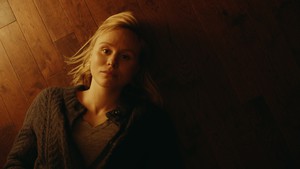
Allison Pill - Actress, Yoli Von Reisen
Allison Pill - Hi!
Eric McClanahan - Hello, how are you?
AP - Good, how are you?
EM - I’m well, thank you. Thank you for taking the time to talk with me today. We’re talking about ALL MY PUNY SORROWS, which is coming out May 3rd, and you’ve already won Best Actress in a couple of Canadian Film Fests. Clearly it’s a very emotional film that tackles some very big issues. What drew you to this project?
AP - Well I had read the novel it’s based on around the time that it came out because I think that Miriam Toews is one of the most extraordinary writers working today. The book managed to, despite being about suicide and mutligenerational trauma, make me laugh out loud throughout it, which was not something I expected. And when the idea of making this movie was brought to me I thought “I don’t know how you could make this a movie” but then in reading Michael McGowan’s script I thought he had captured the essence of the sisters’ relationship and had maintained so many of these moments of absurd laughter in the midst of despair that I thought it was a really exciting thing to be a part of.
EM - Now I know that Miriam tapped into her own life to write this story, so in portraying Yoli you are essentially playing Miriam. Did you get a chance to meet with her before starting production on the film?
AP - Unfortunately because of Covid we could not meet in person but I was able to chat with her by phone and we exchanged emails and texts. She made herself totally available to us which was really amazing. After the TIFF premiere, where her mother and daughter both got to see the movie with her, her daughter asked her how much time we’d spent together. [laughs] And Miriam said we’d had a couple of phone conversations and her daughter said “It looks you two have spent all this time together because she’s captured the way you talk and move and you’d expect that you two knew each other for a long time” and now for the rest of my life I don’t need another compliment.
EM - No, that’s high praise. I think you nailed it. So how did you prepare for this role in balancing the dark comedy and heartfelt emotions along with the deep subject matter? How does one prepare to get into a role like Yoli?
AP - Well I am a big proponent of rehearsals. I asked Mike to set up as much rehearsal time as we possibly could since we had all this quarantine time to use. So we were able to meet over Zoom and chat through all of these scenes and run them and figure out the core of them so I felt pretty confident even before the cameras rolled that we knew what the scenes each needed to be. Sarah and I spent a lot of time deconstructing and reconstructing those hospital scenes, which to us were the core of the film. Knowing that if those scenes worked then that’s what the film would hang on. That’s mostly what I did to prepare. And also just spending time in the novel. It’s not often that you get someone as talented as Miriam to write down your character’s inner motivations and inner thoughts. [laughs] So a lot of the homework was done for me in that way. And besides that I think that my own defenses are much like Yoli’s in that I use humor to deflect from serious situations so I can very deeply relate to those sort of avoidance techniques that humor can bring and also the relief that it can bring when you need it.
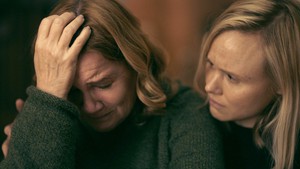
EM - This film impacted me particularly because I lost my brother to suicide when we were teenagers and there were no warning signs at all. One thing that I really latched onto in the film was towards the end when Yoli is trying to find someone to blame so she’s trolling the hospital and her mother has to finally tell her to stop. The anger and the heartbreak in that scene were just really well done and so I wanted to thank you for that.
AP - Thank you. I think, sadly, that a lot of people can relate to this story in various ways. Whether family members or friends are suffering from depression, have attempted or committed suicide, it seems like suicide is this sort of untouchable third rail and has been for so long. And we look to blame a lot of things, whatever it may be. Be it God or the hospital, or the person, or the medicines they were on. I completely understand. It’s a perfectly natural response. Also what this movie does is it says “Can we ask this person who’s suffering from depression what their experience is?” without our judgment. To look at them and say “I want you to live” and have them say “I really don’t want to” and allow that to be a really important part of the discussion. I think adding that to the conversation is one of things that this movie does that’s so important to me. Looking at that person and saying “Let’s not look at what the parents could’ve done or whatever; who did what, it’s not that.” We know so little about the way our brains work. So many of the systems that we have in place to deal with mental health are… not great. The health care system in general we can talk about, but literally just mental health is inaccessible to most and even if you have access it’s just throwing darts in the dark. To look at that and say “We need some better systems in place to support people suffering and to support their families.”
EM - I couldn’t agree more. One of the concerns I had when I first saw the preview and when I first started watching the film was I saw that these characters are people of a privileged class who have the luxury of pausing their lives to deal with their mental illness and when I asked Michael if he feared people might lob this accusation he said “I hope that they’ll find the universal in the particular of their experiences.” What would be your response to that criticism?
AP - I think that it’s a fair one and I think that more stories need to be told about the different ways that mental health can affect different swaths of the population. I also think it’s important to note that the story takes place in Canada, so the hospital that she was at was not a private hospital; it was a public hospital. So, you know, Universal Healthcare. [laughs] But, yes, time away from the job, and she’s a touring musician with a working husband, so yes, there are structures in place that are inaccessible to many people suffering from depression or any other kind of mental health break. I also think it’s a certain story about a family who are white, who are Canadian, and that is the story we told. I think, I hope, that more stories get to be told. I don’t think that it’s a matter of not telling this one, because though it is not necessarily a barometer for mental health generally, but to say “This doesn’t even work for white privileged people, so how would this extend to somebody with fewer resources and less privilege?” So I hope that we all as a society take that on because I think there is a lack of access and a lack of knowledge that it’s… overwhelming to think about how little we know about why antidepressants work in some people and make others more suicidal. It’s also a case of every person’s mental health is individual in a way that we don’t even comprehend.
EM - Right. So we have maybe a minute left so we’re going to go out of the sadness because I have the opportunity to talk to someone from one of my favorite films of all time, SCOTT PILGRIM VS THE WORLD, which turns twelve this year. Looking back on its legacy, what is your takeaway from SCOTT PILGRIM VS THE WORLD and what it gave to us?
AP - I think it was ahead of its time in a beautiful way. It’s always good to be a part of something that could foresee a future that we didn’t all quite have a handle on yet. Me and my friend Satya were able to get everybody together for a Zoom readthrough a couple of years ago during the lockdown. It was such a joy to see all of these people! One of the things I got to take away was my connection to some of my favorite humans. ‘Cause it’s a cast of just great, great people who are super-duper talented and incredibly awesome and funny and a joy to spend time with even if it’s just in a Zoom room. So I’m grateful just to have met all of them.
EM - Well thank you for your time and the wonderful conversation. I wish you the best of luck with the film and let’s do hope that this sparks some conversation.
AP - Thank you so much. Have a great day!
_medium.jpeg)
ALL MY PUNY SORROWS is available now on demand and digital from Momentum Pictures.
Life is hard, and sometimes it does feel like it weighs too much. I understand. I want you to know, however, that you’re stronger than what’s trying to destroy you, and you owe it to yourself to overcome that darkness and be a light to yourself and others. If you’re struggling with dark thoughts or feelings of overwhelming fatigue, talk to someone. Tomorrow can be better, but we have to get through this night first. The only way out is through. Never be afraid to reach out. Someone wants to see you again. Someone needs you. You are loved.
If you or someone you know is struggling with thoughts of self-harm, call 1-800-273-8255.
-McEric, aka Eric McClanahan-
